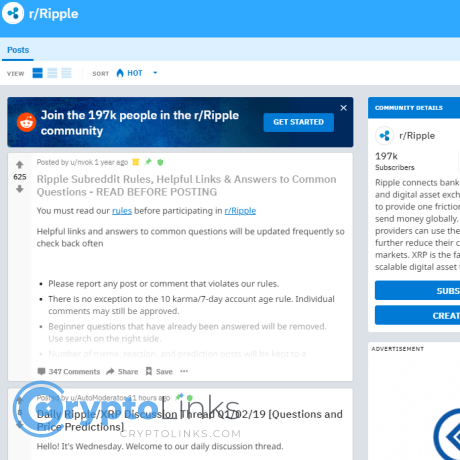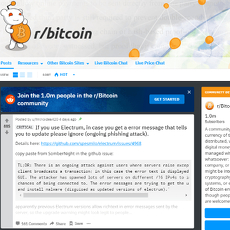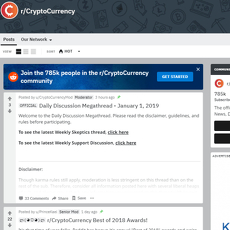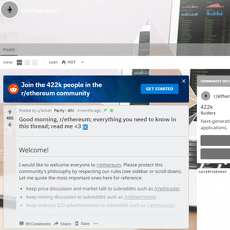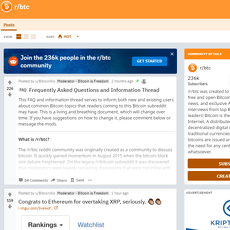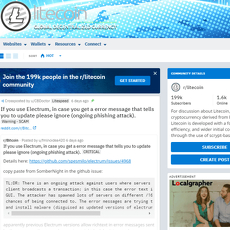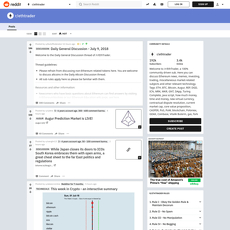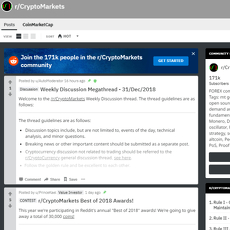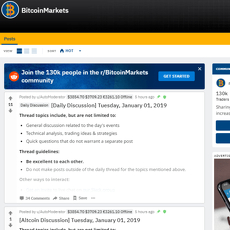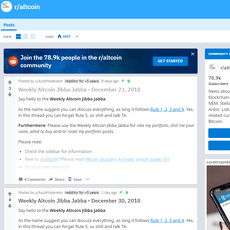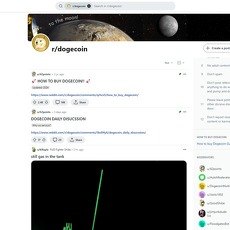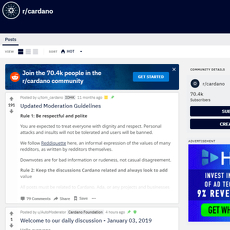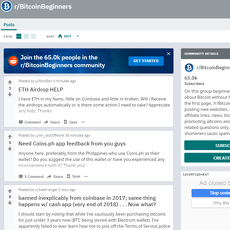r/Ripple Review
r/Ripple
www.reddit.com
r/Ripple (Reddit) review guide: get real XRP signal fast, skip the hype
Want a faster way to track XRP news, court updates, and real builder talk without scrolling for an hour?
If you’ve ever opened r/Ripple and felt buried under “breaking” headlines that aren’t new, price chants, and hot takes that don’t add up, you’re not alone. The good stuff is there—smart legal breakdowns, XRPL dev threads, and useful news—but it’s easy to miss if you don’t know how to read the room.
This guide is your shortcut to getting real signal from r/Ripple. I’ll show you what’s worth your time, how to steer around the noise, and where to double-check facts (think Ripple’s newsroom, the XRPL Foundation, and primary legal sources) before you share anything.
The common headaches with crypto subreddits
Reddit can be an edge—or a distraction. Here are the repeat offenders that make people give up too soon:
- Endless “BREAKING” that isn’t new: A press release from months ago gets reposted like it happened today. One bank test or an old pilot gets framed as a done deal.
- Price spam and cheerleading: “$10 this week” posts with zero method, no sources, and lots of emojis. Fun to read, useless for decisions.
- Ripple vs XRP vs XRPL confusion: Some threads mix up the company, the asset, and the decentralized ledger. That muddles real conversations about adoption and tech progress.
- Legal nuance turned into headlines: Subtle court filings get boiled down to “XRP fully vindicated” or “game over,” which isn’t how law works.
- Recycled narratives: “ISO 20022 switch = instant pump,” “any day now,” “insider confirms,” you know the drill.
- Scam bait: Fake airdrops, impersonator accounts, and “support” DMs. If a post asks for your wallet seed, it’s a trap. Always.
Seen this before? “BREAKING: Major bank partners with Ripple (again)!” Then you click and it’s a year-old pilot, or a rumor with no source.
Why this happens matters. Social platforms are built to reward engagement, not accuracy. Research has shown that falsehoods often spread faster than the truth because they’re more novel and emotional—exactly the kind of content that gets upvoted fast and often. If you want a quick primer on why hype travels, check the Science study on misinformation spread: “The spread of true and false news online”. And yes, people who mainly get news from social media tend to be less informed on key facts—Pew has been flagging that for years (here’s one example).
The point isn’t to avoid Reddit. It’s to use it like a tool. Once you know what to ignore and where to look, r/Ripple becomes a fast track to useful info.
What I’ll help you do
- Filter the feed so you see high-signal posts first, not the loudest headlines.
- Read the room and spot threads where lawyers, builders, and well-informed regulars actually hang out.
- Find trustworthy sources behind claims—court documents, Ripple’s blogs, the XRPL Foundation, and credible repositories.
- Avoid traps like fake airdrops, impersonators, and “guaranteed” price calls with no data.
I’ll also point you to recurring thread formats that consistently deliver value, and a simple way to build your own “quick-check” workflow so you don’t waste time.
Who this guide is for, and what r/Ripple is (and isn’t)
Whether you’re XRP-curious, a long-time holder, or shipping code on XRPL, this is for you. You’ll get practical steps that work no matter your starting point.
- If you’re new: You’ll avoid the classic traps and learn how to separate Ripple (the company), XRP (the asset), and XRPL (the ledger).
- If you hold XRP: You’ll build a clean workflow for legal updates, enterprise news, and technical progress—without getting pulled into price echo chambers.
- If you build on XRPL: You’ll know where to find dev-focused threads and how to get better answers when you ask.
What r/Ripple is: a community hub for discussion around Ripple, XRP, and the XRPL—legal news, partnerships, tech updates, and the occasional spicy debate.
What it isn’t: investment advice, a trading signals room, or an official Ripple channel. Mods are volunteers, not company reps. Treat every big claim like a lead you need to verify.
If that sounds like exactly what you need, you’re in the right place. Next up: what the subreddit actually focuses on, the vibe you can expect day to day, and how it compares to r/XRP so you can pick the best lane for your time. Curious which one will fit your workflow better?
r/Ripple at a glance: purpose, vibe, and how it’s different from r/XRP
Think of r/Ripple as the XRP “control room” on Reddit. The focus isn’t just price—it's Ripple the company, XRP the asset, and the XRPL as real infrastructure. You’ll see threads on enterprise partnerships, court filings, CBDC pilots, ISO 20022 chatter, and XRPL upgrades (AMM, Hooks, sidechains). When legal news breaks, activity spikes fast; on quieter days, the feed leans into research, tutorials, and dev talk.
How active is it? Put simply: busy. Membership sits in the hundreds of thousands, and engagement is steady with multiple fresh posts each day and comment sections that can run long, especially during court milestones or new feature releases. If you like peeking at data, tools like SubredditStats give a sense of posting tempo over time.
How it compares to r/XRP? r/XRP often leans into market sentiment and shorter-form takes. r/Ripple tends to host more legal context, partner news, and builder-focused discussion. There’s overlap, but the tone on r/Ripple skews “operator mode” instead of pure hype. That’s exactly why I keep it in my daily research loop.
“Signal beats noise when you know where to look.”
Community size, tone, and posting rhythm
The day-to-day pattern looks something like this:
- News links: Ripple blog posts, partner announcements, regulatory updates, and credible media coverage. Expect quick sourcing to primary pages like the Ripple Insights hub or partner press rooms.
- Legal talk: SEC v. Ripple threads heating up around filings, deadlines, and judge orders. You’ll often see legal megathreads stickied up top on big days.
- Dev updates: XRPL proposals, AMM discussions, Hooks experiments, and ecosystem tooling. Common sources: XRPL Foundation docs and the XRPLF GitHub.
- Opinion and analysis: Utility narratives vs. speculation, liquidity angles, enterprise adoption timelines, CBDC pilots, and ISO 20022 alignment.
The tone is pro-XRP without being a monoculture. Most regulars respect evidence and are open to challenge if you bring sources. When the mods are active, debates stay productive and off-topic noise gets nudged aside.
Posting peaks around major US/EU hours and surges on court days or notable partner news. If you only have a few minutes, checking the top posts of the last 24 hours usually catches the strongest threads.
Rules and moderation: what gets removed (and why it matters)
r/Ripple’s rules reward people who bring receipts and context. They’re worth a quick read in the sidebar and on the rules page. The highlights I see enforced most often:
- Flairs matter: Posts are expected to use flairs like News, Legal, XRPL Dev, Education, Analysis, or Question so readers can filter fast.
- Sources over slogans: Big claims need links—court documents, Ripple newsroom, XRPL Foundation, reputable outlets. Headline-only posts or unsourced rumors get removed.
- No spam or shills: Referral links, fake airdrops, impersonators, and low-effort price “calls” are usually deleted quickly.
- Keep it civil and on-topic: Tribal fights, personal attacks, and cross-sub brigading don’t last.
This isn’t just a vibe preference. Research on Reddit communities has found that strong moderation improves discussion quality and reduces abuse over time (see Chandrasekharan et al., 2017). On r/Ripple, that translates into less distraction and better signal for people trying to follow real progress on the ledger and in the courts.
Pro tip before you post: use the search bar, skim the sticky at the top, and tag your thread correctly. You’ll get better responses and avoid duplicate removals.
Recurring threads worth your time
There are a few formats here that consistently deliver value. If you only track a handful, make it these:
- Legal megathreads: Centralized places to follow SEC v. Ripple updates, orders, and credible commentary. Try a quick search for “megathread” when court dates are near.
- Weekly roundups: A clean digest of the week’s top items—handy when you’ve been busy and want a quick catch-up.
- XRPL builder threads: Discussions on AMM parameters, Hooks experiments, performance notes, and tooling. If you’re technical, these are gold; if you’re not, they help you separate real progress from marketing fluff.
- Education posts: Explainers on ODL, liquidity hubs, custody, CBDC pilots, and how XRPL features actually work. Great for onboarding friends or refreshing your own mental model.
- Occasional AMAs and Q&As: From ecosystem contributors or well-known community members. They don’t happen every week, but when they do, the comment sections are packed with insights.
If you’re scanning fast, look for flairs like Legal, XRPL Dev, News, and Education—those tags punch above their weight in quality. You can also filter the sub by flair or search specific formats like “weekly” or “dev” to hop straight to higher-signal threads.
Quick gut-check I use: Does the post link to a primary source (Ripple newsroom, court docket, XRPLF docs, partner press release)? If yes, it’s usually worth a click. If it’s just a cropped screenshot or a flashy headline with nothing behind it, I skip.
You’ve seen the lay of the land. Want the fastest way to turn this busy subreddit into a clean research feed you can scroll in under five minutes? In the next section, I’ll show the exact filters, flairs, and saves I use to surface only the good stuff—curious which two settings cut my noise by half?
How to use r/Ripple like a pro
You don’t need more posts—you need better filters. r/Ripple can be a clean stream of signal if you set it up right. Here’s exactly how I turn the subreddit into a fast, low-noise research feed for XRP, XRPL, and real legal/tech updates.
“In a noisy market, your edge is filtering, not predicting.”
Search, sort, and save
I start with structure. A few small tweaks and you’ll see the best stuff first and keep it organized for later.
- Sort by Top with a time filter: Hit Top (Week) or Top (Month) to surface posts that earned strong engagement without being ancient. It trims knee-jerk reactions and rewards well-sourced updates.
- Use “New” for breaking headlines, then confirm: Flip to New when news is moving. Save only after you verify (more on that below).
- Precision search inside the sub:
- Exact phrase with quotes: “programmatic sales”
- Exclude noise with a minus: ODL -price
- Target titles: title:"amendment passed"
- Limit to the sub: use the search bar on r/Ripple and tick “limit to subreddit” or add restrict_sr=1 via the URL.
- Check old.reddit for quick scanning: The classic layout is faster when you’re triaging links: old.reddit.com/r/Ripple.
- Save power posts: Click “Save” on legal megathreads, XRPL amendment discussions, and deep research. I keep a running list focused on:
- XRPL amendments and rollout threads
- Legal recaps tied to case number 20-cv-10832 (SDNY) found via CourtListener
- Partner announcements confirmed by both Ripple’s newsroom and the partner’s site
Flairs and tags to watch
Flairs are your fast lanes. Filter by them and you’ll cut through cheerleading and recycled headlines.
- Legal: Court events, rulings, schedules, credible lawyer threads. Filter: Legal flair
- XRPL Dev: Amendments, AMM/Hooks talks, repos, technical debates. Filter: XRPL Dev flair
- News: Enterprise partners, liquidity updates, regulations. Filter: News flair
- Education: “What is ODL?”, “How XRPL AMM works,” wallet safety. Filter: Education flair
When a post hits two buckets—say, “News” plus solid “Education” in the comments—it’s usually a keeper. I’ll save it and cross-reference with primary docs in minutes.
Ask better questions, get better answers
The sub actually has a lot of smart people—devs, researchers, and legal-watchers—who show up when you ask sharp questions. Vague posts attract vague answers. Specifics signal you’ve done the work and invite better replies.
- Show your homework: Link what you’ve read and ask for the missing piece. Example:
- “I see the AMM amendment listed here: known amendments. What risks are market makers seeing post-activation? Any real trades shared on GitHub or dashboards?”
- Tag it right: Pick the proper flair. If it’s technical, choose XRPL Dev. If it’s court-related, use Legal. It routes your post to people who care.
- Be laser-specific: Swap “Is XRP going up?” for:
- “How do liquidity corridors change if [partner] expands ODL to [region]? Source: Ripple Insights and partner release here: [link].”
- Reference primary material so others can build on it:
- XRPL docs: xrpl.org
- XRPLF repos: github.com/XRPLF/rippled
- Case filings: CourtListener search (20-cv-10832)
- Status: status.xrpl.org
Smart questions compound. The more you show your process, the more the right people show up. It’s social proof for researchers and builders.
Verify before you share
Fast doesn’t matter if it’s wrong. False headlines spread faster than true ones online (see the Science study by Vosoughi, Roy, and Aral, 2018: science.org/doi/10.1126/science.aap9559). I use a simple check sequence:
- Find the origin:
- Legal: case number and filing link via CourtListener
- Company news: Ripple Insights and the partner’s press room (don’t rely on screenshots)
- Tech changes: XRPL docs, XRPL Foundation, and commits in rippled
- Get two independent confirmations: Ripple + partner; doc + reputable legal summary; XRPL docs + repo commit.
- Check dates and versions: Is that court doc the latest? Is the amendment actually enabled on mainnet? Confirm via status.xrpl.org or the amendment page.
- Beware recycled rumors: If the thumbnail looks familiar or the title screams certainty with zero links, assume it’s a repost. Search the sub with quotes around the headline.
- Never act on screenshots: Track the source URL. If you can’t find it, treat it as entertainment, not information.
Rule of thumb: If a claim affects billions in market cap, the primary source will exist—and it won’t be a Telegram JPEG.
Want to see where this process really pays off—what content consistently holds up under scrutiny, and where r/Ripple still struggles with hype and recycled takes? That’s exactly what I’ll unpack next. Which type of post should you trust at a glance, and which ones should you scroll past without a second thought?
Content quality and safety: where r/Ripple shines (and where it struggles)
I use r/Ripple to spot what matters fast: real legal movement, real XRPL progress, and real signals from builders. It’s also where noise tries to sneak in. The good news? When you know what “good” looks like, you can scroll with confidence.
“Trust, but verify. In crypto, that’s not cynicism—it’s survival.”
Where it shines: fast court updates, research threads with sources, and thoughtful dev content around XRPL features. Where it struggles: price hype, recycled speculation, and “ISO 20022 will make XRP moon tomorrow” posts. You’ll see both—your edge is knowing which is which.
What you’ll see most: news, court updates, and builder talk
On a typical day, r/Ripple’s front page mixes legal headlines, Ripple/partner news, and XRPL developer updates. Here’s how I spot the high-signal threads:
- SEC v. Ripple coverage — Look for posts that cite court dockets (e.g., CourtListener) or link to filings, not just screenshots of tweets. The best threads summarize the ruling or motion, then link to the primary document.
- ODL/Ripple Payments and enterprise partnerships — Strong posts link to the Ripple newsroom or a partner’s press page (banks, remittance firms, fintechs). Weak posts say “major bank rumored” with no source.
- CBDC pilots — Good discussions reference official pilots or public statements (e.g., Bhutan, Palau, or central bank proof-of-concepts). Beware “X country has adopted XRP as its CBDC” claims—CBDCs are sovereign projects, not tokens you buy on an exchange.
- ISO 20022 chatter — Solid threads explain this as a messaging standard for financial institutions. No crypto asset becomes “ISO 20022-compliant” the way a bank’s system does. High-signal posts link to standards bodies or bank communications.
- XRPL features and dev updates — Expect talk around AMM (XLS-30) rollout/iterations, Hooks progress on devnets, XLS-20 NFTs, Sidechains/EVM compatibility, and performance upgrades like Clio. The best posts link to XRPL.org docs, XRPLF GitHub, or release notes for rippled.
What a high-signal post looks like: It links to primary sources (court docs, Ripple/partner releases, XRPL Foundation docs), includes timestamps or version numbers, and invites corrections. What to skip: headline-only posts, chart memes with no methodology, and “insider info” with no receipts.
Scam radar: airdrops, impersonators, and “too good to be true”
Crypto scams thrive on speed and FOMO. On Reddit, the patterns repeat: fake airdrops, “support” DMs, lookalike accounts, and links that ask for your seed phrase. Two quick truths keep you safe:
- No legitimate support will DM you first.
- No real airdrop needs your seed phrase. Ever.
Research backs this up. Chainalysis has repeatedly flagged phishing and impersonation as major on-ramps for crypto theft, and the FTC warns that social platforms are a leading channel for investment scams. Reddit is not immune.
How a fake XRP airdrop usually looks:
- New account posts “official” airdrop with a shortened link.
- Comments from fresh or low-karma accounts say “confirmed legit.”
- Landing page imitates Ripple/XRPL branding and asks you to “connect wallet” or enter seed/secret numbers.
How to vet an airdrop safely:
- Check if it’s announced on Ripple’s official channels, the XRPL Foundation blog, or an official partner press release. No announcement, no click.
- Confirm the domain (typos and lookalikes are common). Type URLs manually.
- Never share a seed phrase or XRPL secret. Legit flows use signed transactions—never recovery phrases.
- On XRPL, scammers sometimes push you to add a trust line and then send you to a phishing site. A trust line itself won’t drain your wallet—but entering your secret on a fake site will.
- Use a burner wallet for experimental claims. Keep your main stash offline.
- Review allowances/approvals regularly and revoke suspicious ones with tools like revoke.cash (EVM ecosystems). For XRPL, stick to known tooling linked from XRPL.org.
- Report impersonators and phishing to mods; don’t engage in DMs.
Common impersonators to avoid:
- “Ripple Support” or “XRPL Help” accounts offering to fix a stuck transaction.
- Lookalike usernames using Unicode characters (the name looks right but isn’t).
- “Influencers” promising to 2x–10x your XRP if you send first. That’s a one-way trip.
For personal peace of mind, bookmark these official sources for verification:
- Ripple Insights / Newsroom
- XRPL.org documentation and the XRPL Foundation
- SEC Investor Alerts on scams and impersonation
- Chainalysis Crypto Crime Reports for scam patterns
SEC v. Ripple in 60 seconds
Here’s the context behind most legal threads you’ll see on r/Ripple:
- In 2020, the SEC sued Ripple, alleging XRP sales were unregistered securities offerings.
- In 2023, Judge Analisa Torres ruled that programmatic sales of XRP on public exchanges were not securities transactions, while certain institutional sales could be investment contracts under U.S. law.
- That’s why you’ll see nuanced debates: XRP itself isn’t deemed a security, but how it’s sold can matter.
- Post-ruling steps have focused on remedies and procedure. For accuracy, check the docket directly: CourtListener: SEC v. Ripple.
On r/Ripple, the best legal posts link to the filing, include a timestamp, and separate facts from commentary. Be wary of “case over” or “guaranteed win” claims—legal nuance is the point, not the exception.
Now, the elephant in every XRP room: is utility finally winning over speculation, and what about the spot ETF chatter? If you’ve ever wondered where the line is between real-world usage and pure hopium, you’ll want what’s next…
Narratives you’ll keep hearing: utility, ETF talk, and price expectations
If you hang around r/Ripple for a week, you’ll notice three storylines on repeat. Some are useful. Some are noise. Here’s how I separate the real signal from the stuff that burns time—and sometimes wallets.
Utility vs speculation
Two kinds of posts tend to dominate:
- Utility threads — cross-border payments, liquidity corridors, XRPL features, real integrations.
- Speculation threads — price calls, moon math, charts with no sources.
I lean hard toward the first group. Utility isn’t a slogan; it leaves a data trail. When someone claims “Ripple expanded in LATAM,” the high-signal posts usually include links to:
- Ripple’s newsroom or quarterly markets updates — start with Ripple Insights and search “XRP Markets Report.”
- Partner press releases from licensed money transmitters or banks.
- XRPL code, issues, or releases — see XRPLF/rippled for truth straight from the repo.
- Third-party analytics — Messari’s XRP profile, Kaiko liquidity snapshots, or exchange order-book depth shared by users.
One reason “utility” matters: cross-border payments are still slow and expensive. The World Bank has tracked average remittance costs hovering well above the 3% global target for years. Any tech that improves settlement speed, transparency, or liquidity has a shot at real adoption—if it proves it at enterprise scale.
“Extraordinary claims require extraordinary evidence.” — Carl Sagan
So I reward posts that bring receipts: corridor volumes, licensed partners, regulatory approvals, or code merges tied to live features (like XRPL’s AMM going live in 2024 and subsequent volume snapshots shared by builders). If a thread has none of that and still promises the world, I scroll.
What an XRP spot ETF could mean (if it happens)
ETF speculation is the subreddit’s favorite recurring cliffhanger. Here’s the cool-headed version:
- Access: A U.S. spot ETF would make XRP easier to buy for institutions and retirement accounts that can’t custody tokens directly.
- Flows: Look at what happened after U.S. spot ETFs for BTC (and later ETH) launched—multi‑billion inflows materialized fast. If XRP ever cleared similar hurdles, inflows could be meaningful.
- Reality check: There’s no approved U.S. spot XRP ETF today. Europe already lists XRP exchange‑traded products (for example, 21Shares’ ETP on SIX), but that’s not the same as a U.S. spot ETF.
Common tells of hype posts:
- “Approval on X date” with no filings, no 19b‑4/ S‑1 links, and zero reputable coverage.
- “Guaranteed” price targets tied to imaginary fund flows.
- Screenshots from unverified accounts on X passed around without source links.
Balanced takes usually cite:
- Actual SEC filings, court milestones, or exchange relistings.
- Comparables from BTC/ETH ETF flows reported by outlets like Bloomberg or verified fund trackers.
- Liquidity constraints (order-book depth, slippage) that affect how much “new money” the market can absorb without wild swings.
Bottom line: an ETF could be a strong catalyst for access and narrative, but it isn’t a strategy. Set alerts for real filings, not rumors—and bookmark posts that link to primary documents.
Reading price posts without getting burned
Price threads can be helpful—if the poster shows their work. I trust methods over memes. Here’s my quick sniff test:
- On‑chain and network data — references to XRPL metrics, wallet activity, DEX/AMM volumes, and supply concentration trends. If they quote data, they should link it.
- Liquidity context — mentions of order‑book depth, market‑maker quotes, or spreads from sources like Kaiko. Liquidity moves price as much as headlines do.
- Derivatives pressure — funding rates, open interest, and liquidation clusters. Even a solid spot trend can get steamrolled when perp traders overcrowd one side.
- Macro anchors — dollar liquidity, rates, risk appetite, and how BTC’s dominance can mute or amplify alt moves.
- Timeframes — clear entry/invalidations beat “to the moon” every day of the week.
Red flags I ignore:
- “$10 soon” with no sources or timeframe.
- Recycled fractals from 2017 pasted onto today’s chart with no context.
- Screenshots of indicators without raw data or links.
Practical example from posts I save: someone tracks XRPL AMM pool growth, pairs it with exchange liquidity for XRP/USD and XRP/USDT, overlays funding rates, and notes a catalyst like a major corridor expansion confirmed by a partner press release. That’s a thesis—not a wish. I’ll bookmark that, watch how the data evolves, and check back next week.
If you’re thinking, “Great—but where do I get the right links without doom‑scrolling?” you’ll like what’s next. I’ll show the exact sources I pair with r/Ripple so you can verify headlines in seconds and build your own high‑signal feed. Ready for the toolkit?
Alternatives, sources, and my go-to toolkit
I treat r/Ripple as my curated “front page” for XRP and XRPL—but it’s not the whole stack. If you want fast updates without the fluff, you’ll want a few more tabs. Here’s how I compare the main venues and how I stitch them together so I don’t miss real news or builder signals.
r/Ripple vs r/XRP, r/CryptoCurrency, X, Discord, and forums
- r/Ripple: Best for XRP-specific threads that actually link to sources. Legal megathreads, partner news, and XRPL dev posts surface quickly when mods are on their game. If there’s a court order or a feature flag going live on XRPL, the thread you want is usually here.
- r/XRP: Bigger raw volume and more price talk. You’ll see excitement and sentiment faster, but it takes extra filtering to separate speculation from anything you can verify. I use it to gauge community reactions, not to make decisions.
- r/CryptoCurrency: Great for the wider backdrop: macro narratives, market structure, ETF talk across assets, and regulatory shifts that affect everybody. If XRP moves with a market-wide catalyst, you’ll spot the context here first.
- X (Twitter): Real-time firehose. My shortlist includes legal voices, XRPL devs, and company accounts. It’s fast, but verify everything. A 2018 paper in Science found false stories spread faster than true ones on social platforms—so treat viral “breaking” posts as unconfirmed until you see the docs.
- Discord (XRPL/RippleX and dev servers): Where implementation details live. You’ll catch testnet notes, PR discussions, and breaking changes before they reach mainstream posts. Bring specific questions and read the pinned messages—dev channels are efficient, not hypey.
- Independent forums: Good for long-form explanations and archiving, but slower cadence. I use them to follow deep technical debates after the smoke clears.
Think of it like this: r/Ripple for curated signal, r/CryptoCurrency for macro context, X/Discord for speed (with skepticism), and forums for durable explanations. That combo keeps you early and accurate.
Handy resources I recommend
Most of the drama on Reddit can be settled in 60 seconds if you check the right link. My bookmarks cover four buckets: legal, company, network, and on-chain.
- Legal: Case trackers and court documents. If a post claims “the judge ruled X,” I look for the order, not the screenshot. No order? It didn’t happen (yet).
- Company: Ripple’s newsroom and confirmed partner press releases. Partnerships worth caring about show up in official newsrooms, not just in Twitter graphics.
- Network/tech: XRPL Foundation docs, release notes, and GitHub repos. Features like AMM, sidechains, or Hooks don’t “launch” until it’s in code, docs, or release notes.
- On-chain: XRP explorers to verify addresses, memos, and transactions. If an airdrop, escrow, or “mystery whale” gets posted, I want the transaction link.
To make it easy, I bundle my trusted links in one place. Bookmark this:
{{longresources}}
Open that anytime a headline smells off. You’ll confirm (or kill) the story in a click or two.
When to go straight to the source
Some posts are worth skimming. Others are worth verifying. Here’s my fast lane for the latter:
- Legal updates (SEC v. Ripple, appeals, deadlines):
- Look for the actual filing: orders, briefs, exhibits. If you only see paraphrases, you’re still in rumor territory.
- Cross-check dates and quotes across at least two legal summaries. When language matters, read the PDF yourself.
- Tech claims (AMM status, feature flags, performance metrics):
- Check XRPL documentation, release notes, and the relevant GitHub repo or issue thread. If it’s not reflected there, it’s not live.
- Dev posts with code snippets, commits, or testnet instructions beat Medium think pieces every time.
- Partnerships and enterprise news:
- Validate via Ripple’s newsroom and the partner’s own press page. If only one side “announced” it, proceed carefully.
- Watch wording. “Pilot,” “MOU,” and “production” are not the same thing.
- Airdrops, support, and giveaways:
- Never act from a comment or DM. Confirm on official domains and docs first.
- Verify any “claim” transaction using a reputable XRP explorer. If you can’t see it on-chain, assume it’s bait.
Rule of thumb: trust screenshots less than URLs, and URLs less than official documents.
A quick note on speed vs. accuracy: real-time chat (X/Discord) can surface real updates minutes before they hit Reddit. But that speed cuts both ways. I keep a two-step check: Is there a primary source? Is a second trusted account echoing it with the same source? If the answer is no, I wait. The market will still be there in 10 minutes.
Want my exact filters, the 2-minute daily routine I use to scan r/Ripple, and whether the sub is actually worth your time? Keep going—I’m laying it all out next, plus the FAQ I get asked every week.
My verdict on r/Ripple + the FAQ everyone asks
If you’re willing to use filters and double-check sources, r/Ripple is absolutely worth your time. It’s one of the fastest places to catch meaningful legal updates, real XRPL conversations, and high-signal news—especially when mods keep threads clean.
Where it shines: legal breakdowns and serious dev talk. Where you need a thicker filter: price hype, recycled rumors, and “airdrop” bait. Treat it like a research feed, not a signals group, and you’ll do great.
Real example: When Judge Torres issued the July 13, 2023 order in SEC v. Ripple, the sub had links to the primary document and useful legal summaries within hours. You can still read that order on CourtListener here: SEC v. Ripple docket. That’s the kind of “first stop, then verify” flow r/Ripple does well.
I’ve watched the community get better at linking to official sources like XRPL docs, the XRPL Foundation, and Ripple’s newsroom. Use those to pressure-test anything you see in your feed.
Should you join?
Yes—if you’re ready to:
- Sort by Top (Week/Month) for signal
- Follow flairs like Legal, XRPL Dev, and Education
- Back-check big claims against primary sources
- Avoid DMs and too-good-to-be-true airdrops
Do that, and you’ll get quality insights without getting caught in the noise.
FAQ
Why do some people say Ripple is “banned” in the US?
It isn’t. The confusion comes from the SEC lawsuit. A key ruling found XRP isn’t a security when sold on public exchanges (programmatic sales), while certain institutional sales can be securities. Some platforms paused XRP in the past during uncertainty, but XRP itself isn’t banned in the US. When in doubt, read the court docs or reputable summaries—start here: SEC v. Ripple docket.
What happens if an XRP spot ETF is approved?
An approval could make XRP easier for institutions and retail to access, which often brings fresh inflows. People like to throw around multi-billion estimates, but until the SEC (or another major regulator) publishes an actual approval order on sec.gov, treat it as a potential catalyst—not a guarantee or a timeline.
Is Ripple the same as XRP?
No. Ripple is a company. XRP is the digital asset. XRPL is the decentralized ledger. Good posts make that distinction clear; upvote the ones that do.
How do I avoid scams on Reddit?
Follow a simple rule set:
- Never share your seed phrase or keys. Ever.
- Ignore DMs offering “support,” “refunds,” or “upgrades.”
- Only trust airdrops announced on official channels (Ripple newsroom, XRPLF, verified project sites).
- Check URLs for lookalikes (e.g., “ripplė[.]com”).
- If a claim feels urgent or emotional, slow down and verify.
Best way to follow court news?
Check the sub’s stickied legal threads, then confirm with:
- CourtListener docket (free access to filings)
- Official rulings and orders on PACER or mirrored archives
- Summaries from recognized legal analysts (and always cross-check quotes with the PDFs)
Pro tips to get more from the sub
- Sort smart: Top → Week/Month for the highest-signal threads, then New for fresh legal filings.
- Live on flairs: “Legal,” “XRPL Dev,” “Education,” and “News” are your fast lanes.
- Save the good stuff: Bookmark standout comment chains and any post linking to court docs, xrpl.org, or GitHub repos.
- Ask better questions: Be specific, add sources, and tag the right flair. You’ll attract devs and informed regulars instead of cheerleaders.
- Verify headlines: Compare Reddit claims against Ripple’s official newsroom, the XRPL Foundation, or the actual court PDF.
Conclusion
r/Ripple works best as a research tool, not a hype machine. Use filters, trust primary sources, keep your scam radar up, and you’ll stay ahead without wasting hours. Treat it as your XRP home base—then pair it with official docs and verified news for a complete picture.
If you want a clean list of vetted links and tools to go with it, I keep them updated here: cryptolinks.com. Stay sharp and enjoy the signal.

